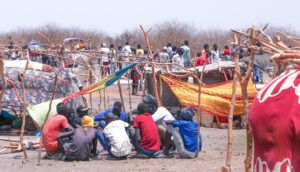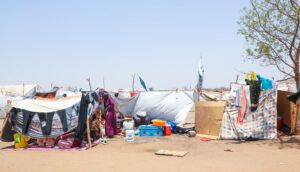 Blogs
Blogs
September 14, 2023 • 5 min read
Kalkidan Yishak has worked for GOAL Ethiopia for two years. He reports from South Sudan, where GOAL teams are responding to the needs of refugees fleeing the growing Sudanese conflict.
History Repeating
For many South Sudanese refugees, the conflict in Sudan brings back unpleasant memories. South Sudan, the world’s youngest country, was plunged into conflict in 2013, resulting in a complex and deadly mix of crises – armed violence, disease, hunger, and economic deterioration, coupled with natural disasters such as droughts or floods, which were already common occurrence in the region. In 2013, over two million South Sudanese refugees made the treacherous journey from South Sudan to Sudan in search of safety. Millions more were internally displaced. The vast majority of those seeking refuge were vulnerable women and children.
Ten years later, South Sudanese refugees are being forced to make that treacherous journey yet again – but this time, the other way around. Over two million people across all of Sudan’s 18 states have been internally displaced since the conflict between the Sudanese Army Forces (SAF) and the Rapid Support Forces (RSF) erupted on April 15th. An additional 880,000 people have sought refuge in neighbouring countries, such as the Central African Republic, Ethiopia, Egypt, Libya, Saudi Arabia, Chad, and South Sudan.
A Humanitarian Disaster
The conflict has culminated in a humanitarian disaster, with a staggering 20.3 million people (over 40% of the country’s population) in Sudan now facing critical levels of food insecurity. Until now, the conflict between the SAF and RSF has largely concentrated in Sudan’s capital, Khartoum. Worryingly, tensions are escalating, and conflict is now spreading to other armed militias across Sudan’s other 17 states.
Fears are growing that the entire country will be engulfed in violence. Vulnerable communities in Darfur and South Kordofan, near the South Sudanese border, are increasingly concerned. GOALies have provided health, nutrition, water and sanitation and non-food items distribution support to displaced people in South Sudan since 1985. These are some of the poorest, most vulnerable communities in the world. With widespread gender-based violence, ethnic cleansing, and arbitrary civilian killings being reported, many South Sudanese refugees have made the difficult decision to return home.
Over 250,000 returnees have officially entered South Sudan over the past four months, with 91.32% being South Sudanese and 79.9% crossing through the Joda border point in Renk, Upper Nile State. Renk has been a crossing point for refugees and returnees for decades. GOAL is currently one of the few agencies still operational in the region.
Supporting Refugees at the Border
Recently, I visited a returnee transit site in Paloich. Paloich is near Renk, the first stop for many South Sudanese returnees, awaiting transportation assistance to return to their places of origin. Regrettably, due to the overwhelming number of returnees who require onward transport assistance, many families languish in the transit site for weeks before accessing the onward transport assistance.

The returnee transit site in Paloich, South Sudan
Many of the returnees I met were forced to make the journey from Sudan to South Sudan on foot. They walked for days, battling hunger and thirst in the hope of reaching safe haven at the border. Sadly, they remained easy targets for thieves. Whatever little personal belongings they were able to salvage from their homes were looted from them, and most returnees arrived at the transit site completely empty-handed, with nothing but the clothes on their backs. Hopeless, visibly distraught and exhausted, they were relieved to finally feel safe.
Angelina’s Story
“We all fled from Sudan to save our lives, and it was not an easy journey,” Angelina says. The 50-year-old mother feared for her own safety, but her main concern was ensuring her five children survived the treacherous journey.
“At least adults can manage hunger and thirst, but children suffered more. More to that, other things which made the journey very difficult. All my money and other small valuable belongings were taken away from me and others who were trying to escape the fighting, so we ended up here completely empty-handed, but again, happy that we can feel safe, far from war,” Angelina says.
I also witnessed the poor living conditions of these returnees, with many lacking sufficient or dignified shelter. Their makeshift houses are locally improvised, covered with torn bed sheets, torn blankets, or even their own clothing. Other families are sleeping out in the open, or under trees – anything to protect themselves from the harsh weather elements. The closest market is a three-hour walk away from the transit site, meaning mothers with young children, elderly people, people with disabilities, and those who had their money stolen cannot easily access food. Most households in the transit site reported to have eight to ten members, many of whom are small children. The demand for nutritional support is extremely high. With demand so high, staff are becoming increasingly concerned about potential food shortages.

A returnee site in Renk, South Sudan
Food supplies are not their only concern. Other concerns I witnessed include a severe shortage of all essential services, including shelter, food, health services for disease prevention and treatment, and WASH (Water, Sanitation, & Hygiene). Agencies like GOAL are working tirelessly to support refugees and returnees in South Sudan, but the magnitude of this disaster is unlike anything the humanitarian community has ever seen before in the region. To tackle extreme hunger and prevent the spread of disease, the international community needs to do more for the people of Sudan. We need your support to save lives, and to provide hope to thousands of families fleeing conflict.
More support is needed
Despite the challenges, GOAL teams are on the ground delivering food, nutrition support, Water Sanitation and Hygiene services and non-food items, including blankets, water jerricans, mosquito nets, solar lamps, survival kits, dignity kits, kitchen sets and hygiene kits.
GOALies are providing targeted nutritional screening and malnutrition treatment to pregnant and lactating women to ensure mothers and their babies are healthy and prevent further worsening of the nutritional status of this vulnerable group. GOALies are also running an inpatient therapeutic programme to treat malnourished children and care for refugees and returnees with medical complications. Please support GOAL’s lifesaving work in South Sudan with a donation today.
